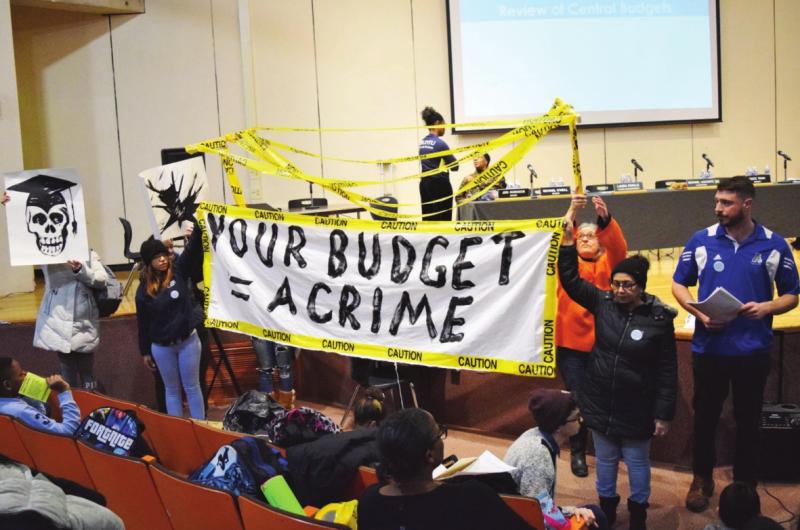

Students and parents from the Blackstone Innovation School demonstrate during a Boston School Committee hearing on the 2020 budget.
At a Boston Public Schools budget hearing last week, during which district officials outlined the Walsh administration’s proposed school budget of $1.139 billion for FY20, students and teachers from the Blackstone Innovation School staged a demonstration demanding an additional $20 million to be added to the budget to improve quality of education.
Although the city officials say next year’s budget is a projected $26 million rise from last year’s approved budget, educational aid from the Governor’s office has remained flat, despite the school system’s increased needs over the last decade.
“[The School Committee] refuses to acknowledge the reality and severity of our current situation. The current budget does not adequately support our most atrisk students,” said Jason Arnold, a teacher at the Blackstone.
Third-grade students from the Blackstone also testified at the meeting last Thursday, which took place at the Josiah Quincy Elementary School. The young students described what they said was inadequate adult supervision, extracurricular programs that have been cut and worn-out physical conditions with missing doors and walls in classrooms.
“If our school doesn’t have enough money, we don’t have enough teachers and supplies. How can we learn? I may not reach my goals,” one third-grader said.
According to Laura Perille, interim BPS superintendent, under Governor Charlie Baker’s proposed budget for next year, the net state aid to BPS would decrease by $12 million.
However, Perille said the district remains committed to key investments.
“We want to sustain three major research-backed initiatives, which include early education, extended school day and great teaching,” said Perille.
She said the proposed budget does not contain an increase in teacher salaries until a contract is settled with the Boston Teachers Union.
Other investment proposals for next year include $3.8 million in new funding to sustain access to high-quality preschool seats as part of the district’s universal pre-K initiative; $750,000 to facilitate improved outcomes for students in schools identified as needing the greatest amount of support; $500,000 for the BPS Office of Engagement to improve communication with families at schools and at BPS Welcome Centers; $375,000 to strengthen science curriculums; $364,000 to host the exam that students must pass to gain entrance into one of the district’s three exam schools, the ISEE, in students’ home schools; and $350,000 to better assist high school students on their path to college.
According to BPS officials, with this budget proposal, per-pupil spending has increased by 25 percent over the past six years from $16,500 in FY14 to $20,700 in FY20.
However, some individual schools have felt financial pressures, especially when their allocated budgets are based on inaccurate enrollment numbers.
Nathan Hale Elementary School teacher Mark Schafer said schools suffer when students arrive after the October cutoff date the district uses to calculate enrollment numbers.
“BPS calculates next year’s student budget based on artificially low enrollment figures, which results in devastating cuts in staffing and special programs,” Schafer said. “If this is happening at the Hale, it must be happening at other schools too.”
The BPS FY20 budget proposal states that enrollment declines are “widespread and consistent across neighborhoods, with the largest regional declines in East Boston and Dorchester.”
Several teachers from the Curtis Guild elementary school in East Boston testified at the meeting about having to cut valuable resources at their school, such as their staff psychologist and community field coordinator, because of the proposed budget next year.
Sonia Medina, a parent of two students at the Blackstone in third and fifth grades, described the extra support her autistic son needed in school.
“My son had no concept of time and was often absent from reality,” she said. “Until it got to the point where he attempted to take his own life.”
However, after receiving special education at school, “My son became a different person,” said Medina. “I’m worried if budget cuts will affect my children in school.”
Additional budget hearings will be held throughout this month, until a meeting March 27 at 6 p.m. at the Bolling Building, during which the School Committee will vote on the FY20 budget.
ON THE WEB
The full FY20 budget proposal can be viewed here: https://drive.google.com/file/d/1Oz3oCQW0nOcSgnOG1iusZxLDaTuKjTye/view